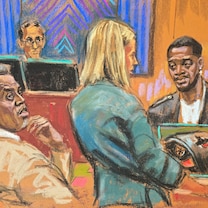Justice Thomas Breaks Silence on Bitter Confirmation Hearings
Justice speaks on bitter confirmation, white liberals' "wrath" and Anita Hill.
Sept. 28, 2007 — -- He is the Supreme Court's most reticent justice, rarely speaking from the bench. But in his new memoir, Clarence Thomas doesn't mince words -- particularly when it comes to desribing the bitter 1991 confirmation hearings that he famously dubbed a "high-tech lynching."
The book, for which Thomas reportedly received a $1.5 million advance, is set to hit store shelves on Monday. ABC News obtained an advance copy from a source other than the publisher. In it, Thomas indicates that he had a premonition of trouble before he was even nominated. Upon hearing from conservative activist Paul Weyrich that he would be the next nominee, his reaction is telling: "I felt sick." He'd watched, he explains, what had happened to previous nominees Robert Bork and Douglas Ginsburg -- both of whom, he notes, were white -- and says he was reluctant to expose himself to the "wrath" of "white liberals" whose "broadmindedness stopped well short of tolerating blacks who disagreed with them."
But Thomas had little idea of what would actually unfold -- culminating, of course, in the sexual harassment accusations leveled by his former employee, Anita Hill. Indeed, he says he actually had thought Hill might be one of the few "liberals" he could call as a character witness.
A good portion of Thomas' book -- titled "My Grandfather's Son" -- is devoted to his upbringing by his maternal grandfather, a man he called "Daddy." Myers Anderson was a barely literate man who ruled over Thomas and his brother with an "iron will," but who also made sure they got an education. He brought Thomas into the Catholic Church -- he found its order and discipline preferable to the Baptist Church to which so many Southern blacks belonged. The religious education Thomas received is clearly central to his outlook today.
So were his encounters with racism -- from a white student who passed him a note that read "I like Martin Luther King ... dead" to lighter-skinned blacks who made fun of his dark skin tones. Throughout the book, Thomas describes wrestling with "the beast of rage" --





